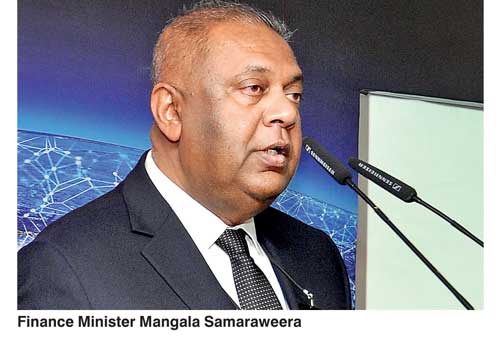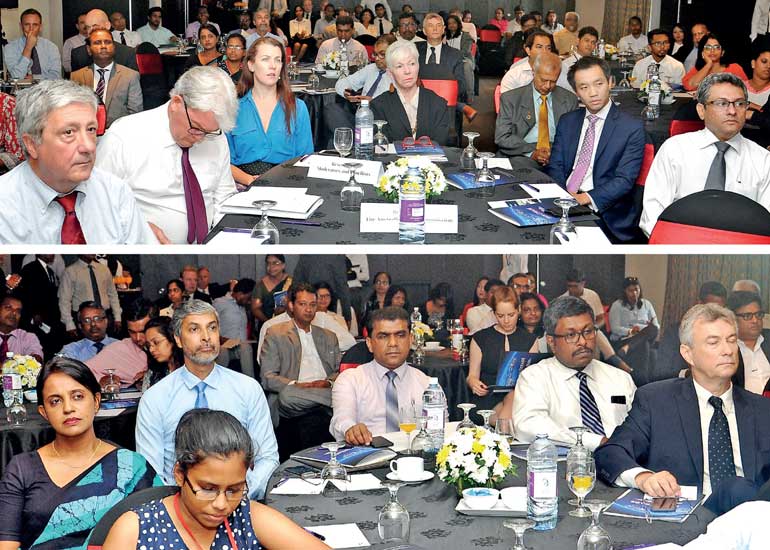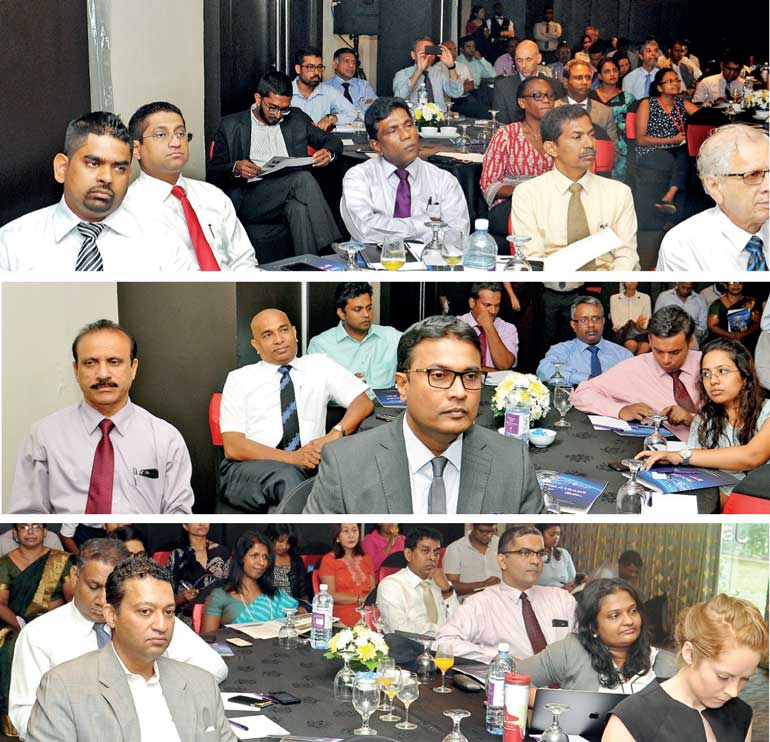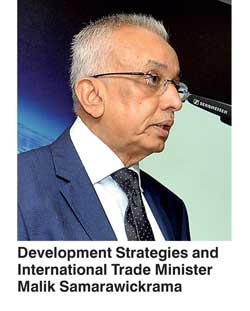Tuesday Feb 24, 2026
Tuesday Feb 24, 2026
Tuesday, 31 October 2017 00:00 - - {{hitsCtrl.values.hits}}
By Charumini de Silva
Finance Minister Mangala Samaraweera yesterday declared that the country was now poised for growth under a Unity Government which has stabilised the economy following a period of macroeconomic imbalances.
“In our first two years of government we focused on stabilising the economy following a period of macroeconomic imbalance. Now we are poised for growth. Growth that is led by exports, facilitated by technology and driven by SMEs, entrepreneurs and start-ups,” Samaraweera said at the
two-day ‘Tech 4 Trade’ forum organised by the Australian High Commission in collaboration with the Ceylon Chamber of Commerce.
“This conference is timely because we aspire to reposition Sri Lanka as a major trading economy in the Indian Ocean. Sri Lanka has been, since ancient times, a trading hub and it is only in the recent past that that has regressed to an inward focus. But today, under the Unity Government, we strive to transform that trajectory and return to our original self as a trading nation in one of the most important sea routes in the Indo Pacific region,” Finance Minister said.
“We have taken the first steps towards this process of reorientation of the economy as market access to over half a billion population in the European Union was regained through the reestablishment of GSP +,” he said, adding that the results were already showing as total exports in the first eight months of 2017 have grown by 7.6%.
“Through the GSP+ facility, seafood exports recorded an 82% increase, while apparel grew by 12.2% in August this year,” Samaraweera revealed.
The Minister also said that the Government was negotiating three important trade agreements with India, China and Singapore to gain further market access for our exports. “When this process concludes in a fruitful manner, our exports will have duty free access to 2.5 billion people in this region,” he stated. Noting that tariff liberalisation was only one part of the broader trade liberalisation agenda, Samaraweera said today the major gains in trade liberalisation are to be made in the process of trade facilitation by improving the efficiency of cross-border transactions and reducing the transaction costs of trade. In order to realise the country’s ambitions to become an Indian Ocean trading hub, the Finance Minister stressed it was essential that Sri Lanka streamlined trade processes to ensure efficiency, transparency, and integrity in a rule-based environment.
He said with the support of development partners, including Australia, Sri Lanka was in the process of implementing a National Single Window for trade facilitation, which would enable traders to fulfil all necessary procedures under one roof. “This would make Sri Lanka a truly attractive destination for efficiency-seeking, export-oriented FDI,” he added.
The future of trade facilitation is however in the application of modern technology. In that context Blockchain has the potential to revolutionise trade finance by drastically cutting down the time taken for transactions, reduce the costs of intermediation, whilst ensuring security and process integrity. “Blockchain will no doubt disrupt traditional trade finance and can be a major boost for trade. Early movers will have a significant advantage – and I am confident that Sri Lanka’s financial sector is taking the message on board,” said the Finance Minister. He said that the implications of such technology go beyond private traders, and have important potential benefits for border agencies. Blockchain technology can enable Customs to audit supply chains in real time, trace the provenance of suspicious transactions, and identify problematic cargo in advance.
Noting that the application of cutting edge technology in key institutions is a major focus of the Finance Ministry, Samaraweera said this year the implementation of RAMIS at the Inland Revenue Department has already yielded good results in terms of revenue administration and collection efficiency.
"We will look at similar applications at the Departments of Excise and Customs as well. Initial steps have been taken by enabling electronic payments at Customs and automated scanning technology. I am very keen to see Sri Lanka’s Customs step up its role as a trade facilitation agency, whilst of course ensuring a healthy contribution to our treasury coffers," he said.
The Government is also taking stock of outdated and archaic legislations, including the Customs ordinance that was introduced in 1856, and the Excise Act of 1912, to enable those institutions to effectively function in the contemporary global trading environment.
Noting that he was pleased that the conference includes a session dedicated to the SME trading sector, Finance Minister said for too long Sri Lanka’s exports have been dominated by corporate giants. "We are in the process of empowering the SME sector, which we hope to see becoming the driver of export growth in the future. The Vision 2025 policy document envisages SMEs functioning in an enhanced digital ecosystem. Since financial transaction risk is a major barrier to SME access to markets, Blockchain technology can go a long way towards improving SME export potential," the Minister added.


Despite the challenges in pursuing an outward oriented strategy at a time of great global strain, Development Strategies and International Trade Minister Malik Samarawickrama said the Government was committed to inclusive trade as it was the only path towards prosperity for Sri Lanka.
“The Government remains very clear that Sri Lanka must be an economy that is driven by exports and private investment. It is clear by the global discourse now that there is a lot of scepticism around the inclusiveness of trade. However, as policymakers we have to tackle this challenge head on,” he said in his keynote at the ‘Tech4Trade’ forum organised by the Australian High Commission in partnership with the Ceylon Chamber of Commerce (CCC) yesterday.
Skills and innovation were identified as the key reasons for the backlash against trade and globalisation while he added that there was a growing sense that some people simply had not benefited from trade and globalisation.
“We must do more to equip our people with the skills they need to face global competition and to succeed. Our Government has made skills development a top priority and is investing more in tertiary education, creating more opportunities for vocational and technical training, aligning education systems with industry needs and inviting the private sector to invest in the education sector,” he added.
Given the rapid speed of change in the global economy, the Minister stressed the business-as-usual approach simply would not work anymore.
“Lifelong learning is the new priority. As policymakers, our focus should be on creating more opportunities for lifelong learning, where people can train and retrain throughout their career lifecycle and continually upgrade or change their skills. This will go a long way in ensuring that trade and technology don’t cause redundancy of workers’ skills,” he said.
Noting that the Government had clearly identified innovation as a key policy priority, Samarawickrama asserted that if they were to move the economy into a higher gear, it was critical to make local enterprises more competitive and resilient to the rapid global changes taking place.
He said Governments had a role in creating the right incentives for innovation, introducing clever instruments that help exporters become more innovative, getting rid of unhelpful or harmful regulations that hold back innovation and also, when required to support very directly, investing in R&D. “My ministry is currently engaging with the World Bank to finalise a national innovation and entrepreneurship strategy for the country. With the World Bank’s expertise in rolling out similar programs elsewhere, we are going to introduce a series of instruments that support exporters to upgrade technology and invest in developing innovative products, instruments that support collaborative research in priority export sectors identified in our national export strategy and instruments that support start-ups and high-growth entrepreneurs.”
Alongside this the Government is also looking at reforming a range of procedural and regulatory bottlenecks that hold innovation back through eight taskforces aimed at improving eight aspects of the ease of doing business in Sri Lanka.
The Minister acknowledged that Australia’s Department of Foreign Affairs and Trade (DFAT) was providing the resources for technical assistance and advisory services to enhance competitiveness in Sri Lanka.
“I firmly believe that if trade is the engine of Sri Lanka’s new growth model then trade facilitation is the essential lubricant to make that engine run smoother and better. I know the importance of this firsthand, having been an exporter myself.
For every business, one day’s delay, that extra procedure, that time-consuming process, this all adds up. It all adds to the cost of production, it all adds up to operating costs and it chips away at efficiency in the overall functioning of trade,” he added.
Samarawickrama admitted that not just in the Single Window but across the chain of trade-related procedures Sri Lanka must deploy technology to make it easier, faster and less costly for entrepreneurs.
“Trade finance continues to be a challenge, especially for SMEs, and we must do more to find technology-driven solutions for this. With the Colombo International Financial City coming up and it having a unique legal and regulatory structure, we can use that freedom to experiment with new technologies for trade finance, like Blockchain,” he added. (CdeS)
Pix by Ruwan Walpola